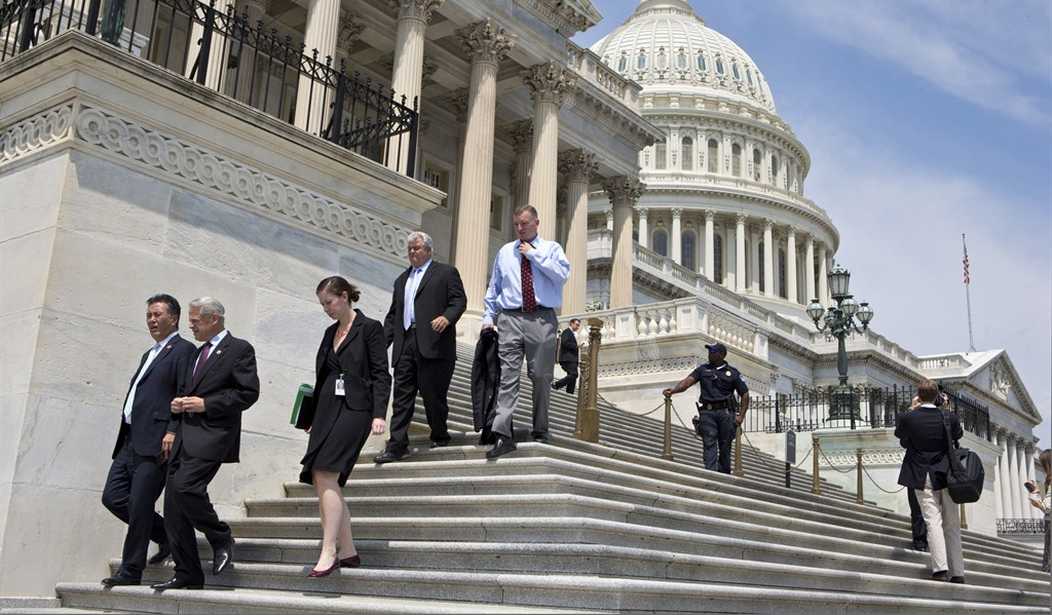Word from the Hill suggests that Republican leaders will offer a short-term CR that funds the government through December 15 at a cost of $988 billion. This resolution would keep most of the sequester intact, but would still increase appropriations by roughly $21 billion relative to the previous CR. Still, it is roughly $70 billion less than President Obama requested. That’s what counts as fiscal discipline these days.
And, in an exceptionally cynical maneuver, the leadership plans to use a parliamentary vehicle to allow House members to take yet another symbolic vote to defund Obamacare. The maneuver, last used in 2011, would have the House vote on two items, the continuing resolution to fund the government and a separate “enrollment correction” that would defund Obamacare. The Senate would have to vote on both items, but if it passes the CR while rejecting the Obamacare addendum, as it almost certainly will, the CR would go on to the president with funding for the health-care law intact. That is exactly what happened in 2011. The Senate rejected the resolution to defund Obamacare, 53–47, and then went on to pass the “clean” CR, 81–19.
The House vote to defund Obamacare would be as meaningless as any of the 40 previous such votes. In fact, it’s worse than that. It’s dishonest — an attempt to fool voters into believing that the House has voted to defund the law, when it really has done no such thing. If congressional Republicans lack the courage to actually do something about Obamacare, they should just go ahead and pass a CR without the subterfuge.
Recommended
Then again, simply maintaining the sequester can be counted as a victory of sorts. After all, some Republicans, such as Representatives Buck McKeon (Calif.) and Marsha Blackburn (Tenn.) have reportedly offered to trade support for President Obama’s Syrian intervention for eliminating the sequester cuts to defense. Now that’s a winning formula — more spending and a war.
On the debt ceiling, Majority Leader Eric Cantor suggested Tuesday that the House might tie an increase to a one-year delay in Obamacare, but the GOP’s exact plans remain unclear. House Speaker John Boehner has spoken vaguely about demanding further budget cuts in exchange for agreeing to raise the debt limit. In the past he has called for a dollar in cuts in exchange for each dollar in additional debt.
Regardless, President Obama is insisting that he will not negotiate on the issue. Given Republican fecklessness on the CR question, it is hard to see them winning a confrontation over the debt limit. At the very least one would expect to see them coalescing around specific proposals for, say, entitlement reform. So far, one looks in vain.
In the short run, no issue is as important as war and peace. Lives as well as treasure hang in the balance. But for the long-term future of this country, preventing the looming fiscal crisis may matter even more.
True, the budget deficit has fallen significantly this year. The economic recovery, anemic as it is, has nonetheless generated additional revenue, and the sequester actually did hold down the growth in spending. As a result, the deficit so far this fiscal year is roughly $750 billion. That’s $411 billion less than last year, but still represents 23 cents out of every dollar we spend.
Moreover, declining deficits are just a temporary phenomenon. According to the Congressional Budget Office, by 2016, deficits will be rising again. By 2022, they will approach $900 billion annually. Our national debt remains above 100 percent of GDP. The unfunded liabilities of Social Security and Medicare heap between $67 and $112 trillion on top of that.
Nearly everyone has remarked on the incomprehensibility of the Obama administration’s Syria policy. Yet, on the equally important issue of our fiscal future, the GOP is looking every bit as inept.
That is a failure we may one day rue even more than Syria.
This article appeared on National Review (Online)
























Join the conversation as a VIP Member